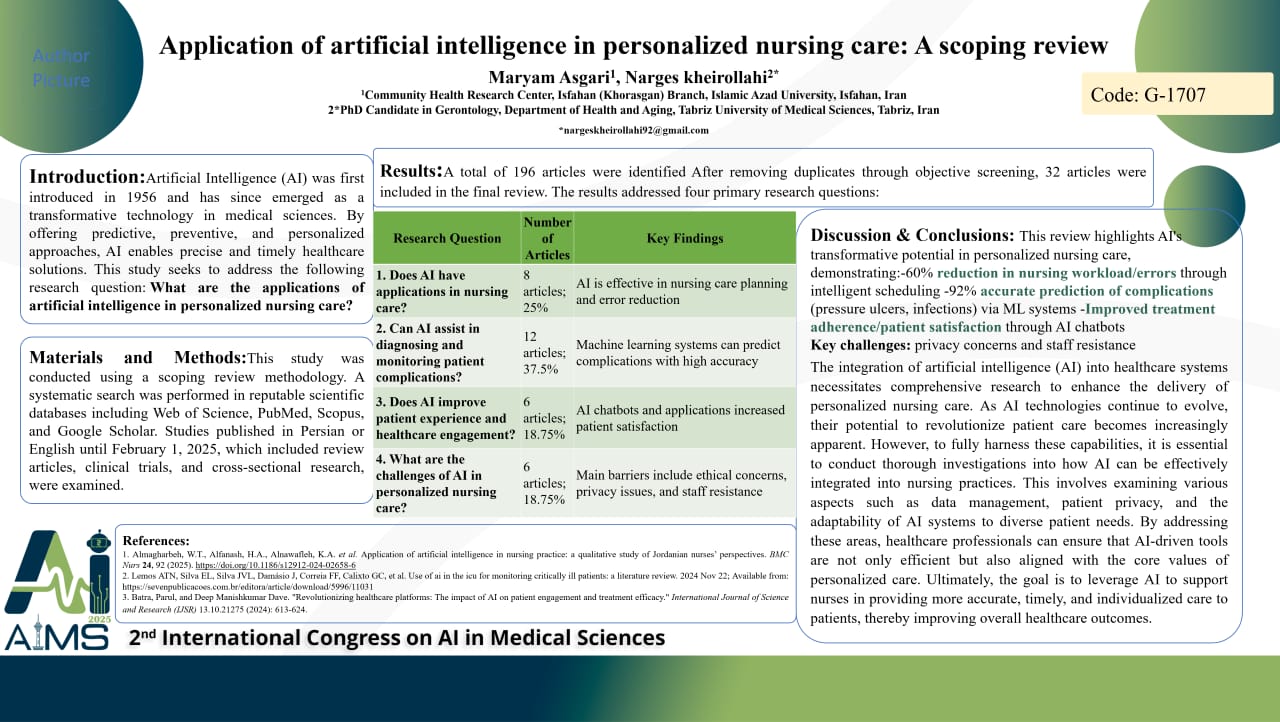Application of artificial intelligence in personalized nursing care: A scoping review
Code: G-1707
Authors: Maryam Asgari ℗, Narges Kheirollahi *
Schedule: Not Scheduled!
Tag: Intelligent Virtual Assistant
Download: Download Poster
Abstract:
Abstract
Background and aims: Artificial intelligence (AI) was introduced in 1956 and has since evolved into an informative technology in medical sciences. AI offers a predictive, preventive, and personalized approach, enabling precise and timely solutions while potentially reducing healthcare costs without compromising quality. This study aims to address the following question: What is the Application of artificial intelligence in personalized nursing care? Method: This study follows a scoping review methodology, conducting a systematic search in reputable databases, including Web of Science, PubMed, Scopus, and Google Scholar, using keywords related to AI, nursing care, and personalized healthcare. All review articles, clinical trials, and cross-sectional studies published in Persian and English until 1 February 2024 were analyzed. After the initial screening, relevant studies were evaluated based on content, methodology, and findings. Results: A total of 196 articles were identified. After removing duplicates through objective screening, 32 articles were included in the final review. The results addressed four primary research questions: Does AI have applications in nursing care? (8 studies;25%), Can AI assist in diagnosing and monitoring patient complications? (12 studies;37%), Does AI improve patient experience and healthcare engagement? (6 studies;18/75%), What are the challenges and limitations of AI in personalized nursing care? (6 studies; 18/75%) Conclusion: Current healthcare models can’t be maintained in their present form. The rapid development of modern technologies, particularly AI, will inevitably transform healthcare delivery. This review provides valuable insights into the multifaceted applications of AI in healthcare and personalized care. Research findings demonstrated that intelligent scheduling algorithms reduced nursing workload and human errors by up to 60%, enabling faster interventions. Machine learning-based systems predicted complications such as pressure ulcers or hospital-acquired infections with up to 92% accuracy. AI-powered chat-bot platforms and applications improved patient adherence to treatment plans by 45% and enhanced satisfaction through personalized education. Studies also identified challenges, including privacy concerns and resistance among clinical staff. In conclusion, integrating AI into personalized nursing care represents a fundamental transformation that requires future investigation to address existing limitations.
Keywords
Artificial Intelligence, Personalized Nursing Care, Technology
